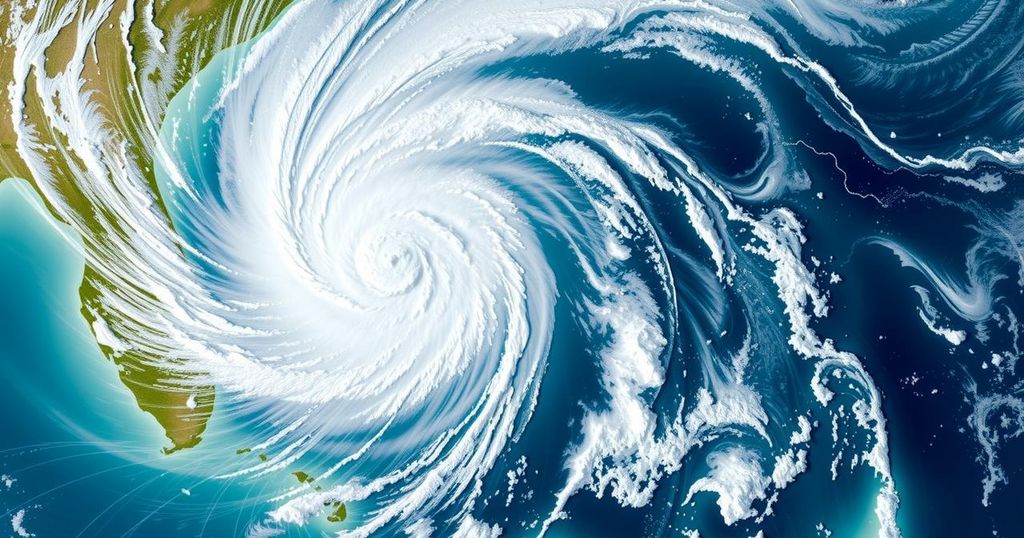Cyclone Chido: The Deadly Storm and the Role of Climate Change in Mayotte’s Crisis

Cyclone Chido devastated Mayotte, causing at least 22 deaths and significant injuries. Climate change intensified the storm, raising wind speeds and increasing the likelihood of such events in the region. The disaster has ignited political criticism in France concerning the government’s disaster response and preparation for climate-related crises.
Cyclone Chido has wreaked extensive devastation across the island of Mayotte, leading to a growing humanitarian crisis. With winds exceeding 200 kilometers per hour, the cyclone has resulted in at least 22 confirmed fatalities and left more than 1,400 individuals injured. Authorities fear the actual death toll could be much higher due to a significant number of undocumented migrants. As efforts to address hunger, disease, and lawlessness intensify, the implications of climate change on this disaster have sparked urgent discussions.
According to the French weather service, Meteo France, Cyclone Chido is the most lethal storm to impact Mayotte in over nine decades. The storm was classified as an intense tropical cyclone—an exceptional occurrence for this French overseas territory. A study from Imperial College London assesses that human-induced climate change enhanced the storm’s winds, raising its classification from Category 3 to Category 4 at its point of landfall. Dr. Nathan Sparks from Imperial College actively highlights the significance of climate change in intensifying tropical cyclones like Chido.
The rapid intensification of Cyclone Chido can be largely attributed to the warm sea temperatures, which were made exceedingly likely due to climate change. Dr. Friederike Otto emphasized the disproportionate impact of climate change on impoverished communities in Mayotte, suggesting that these increasingly frequent disasters exemplify the vulnerability of poor populations who contribute the least to emissions yet suffer the most from climate impacts.
In light of President Emmanuel Macron’s upcoming visit to Mayotte, the disaster’s aftermath poses risks to the ongoing political crisis in France. Criticism has emerged regarding the government’s response, with specific focus on Prime Minister François Bayrou’s virtual attendance at a crisis meeting, drawing ire from various political factions. There is a perception among left-wing critics that the governing bodies have neglected the pressing climate issues affecting Mayotte, including its preparedness for extreme weather events.
Despite the evident vulnerabilities of European overseas territories, historical trends show inadequate action toward climate resilience. A French study has highlighted that these areas are among the most susceptible to climate change effects. Current incidents, such as a legal case surrounding the Dutch government’s inaction to protect the Caribbean island of Bonaire from rising sea levels, reinforce this troubling pattern.
The article discusses the aftermath of Cyclone Chido, which recently struck the island of Mayotte, leading to a significant humanitarian crisis characterized by loss of life, injuries, and infrastructural destruction. It examines the storm’s intensity and the role of climate change in exacerbating its effects. The analysis includes expert insights on the relationship between human activity and the increasing severity of tropical cyclones. The article further explores the political context in France regarding the government’s handling of the crisis and the broader implications of climate change on vulnerable overseas territories.
Cyclone Chido has exposed the dire consequences of climate change, particularly on vulnerable populations in places like Mayotte. As the island grapples with the aftermath of this catastrophic storm, the intersection of humanitarian needs and political responses highlights a growing urgency to address climate change proactively. The findings from scientific studies underline the necessity of mitigating climate risks and enhancing resilience in regions disproportionately affected by such extreme weather events.
Original Source: www.euronews.com




